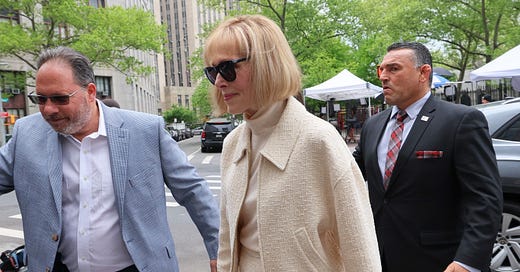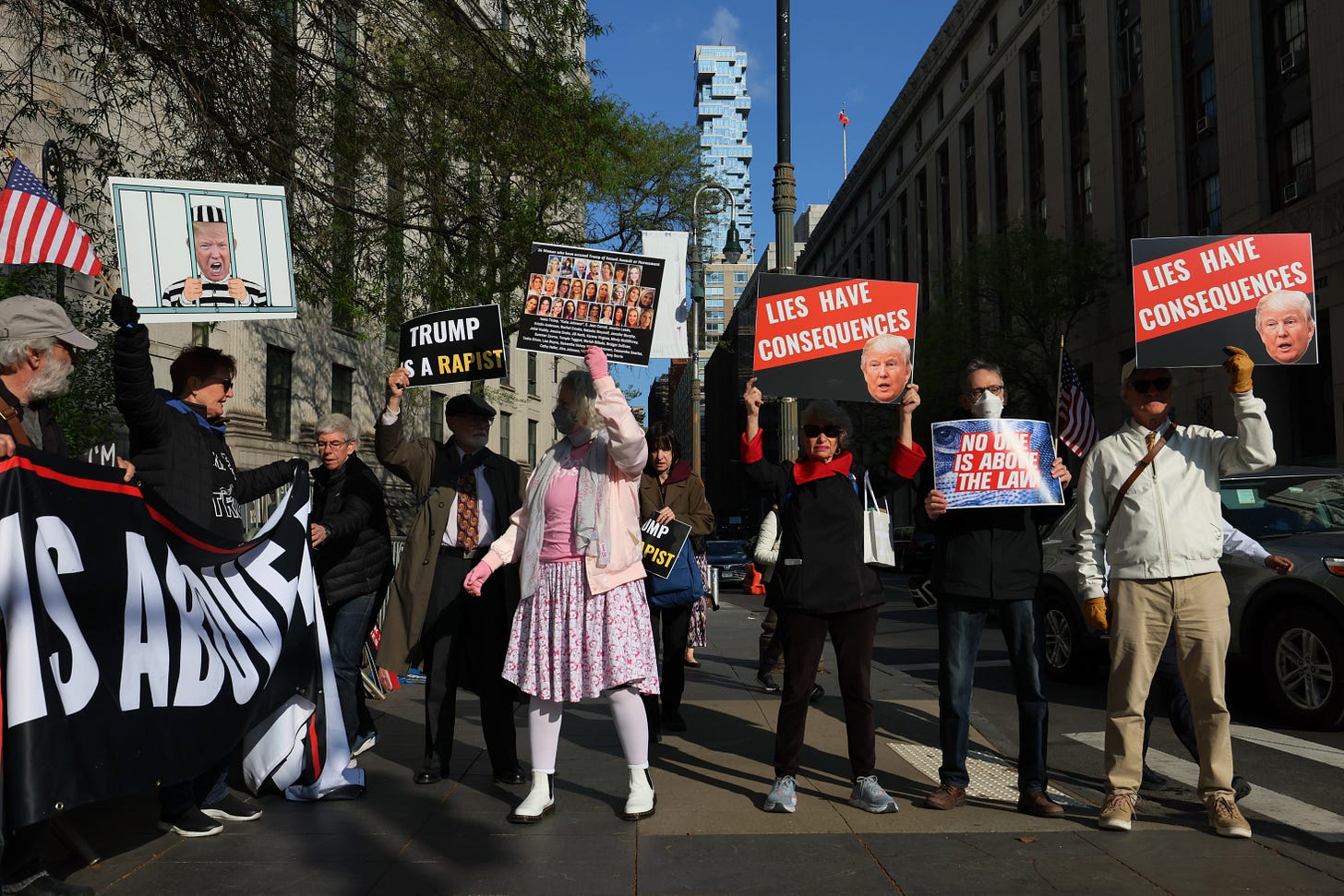Wait, why didn't she scream?
E Jean Carroll, Donald Trump, and the persistent misperception that a rape victim should scream.
You’re reading Wait, Really? — a newsletter unpacking what's in the culture, with a feminist spin. Want to get it in your inbox? Sign up below.
Why didn’t she scream?
Why didn’t she fight back?
Why didn’t she call the police?
These are the questions that, for centuries, defense lawyers — and the public — have asked victims of sexual assault and rape.
But should they be?
I am attending the trial of E. Jean Carroll v. Donald Trump this week, which is taking place in a federal courtroom in Manhattan — a case in which Carroll, a journalist, author, and longtime advice columnist for Elle (who now writes on Substack) has accused the former president of raping her in a department store dressing room in the 1990s.

This is not a new accusation (though I know with Trump, it’s hard to keep up). Carroll first published her accusations as part of a book she had written, excerpted in New York Magazine, in 2019. But it is new to the courts, thanks to a new New York state law that extended the statute of limitations for sexual assault victims, allowing her to sue — in civil court — for battery (for the alleged rape itself) and defamation (for when Trump called her a liar when she spoke up about it). He, of course, had denied the charges, and has also declined (so far) to attend the trial.
I wrote about Carroll’s case back in 2019, during a day that keeps being discussed in court: Ms. Carroll took me on her “Hideous Men” tour, which is honestly a brilliant concept — instead of seeing the homes of gangsters or authors or Sex and the City characters, she took me to famous sites in Bad Man History. So, we walked past Fox News, where many bad things have happened. Over to CBS News, home to one-time CEO Les Moonves and morning anchor Charlie Rose (both fired for sexual misconduct). We went by the Plaza Hotel, which didn’t allow women to eat lunch at the famous Oak Room until 1969 (among other stories); then the Sotifel Hotel, which is where a housekeeper accused former IMF chief Dominique Strauss Kahn of raping her in his hotel room in a story that became a media frenzy (he later settled with the woman).
The last stop on this tour — before we headed to CNN, where she was to be interviewed by Anderson Cooper (a clip that has been shown repeatedly in court) —was Bergdorf Goodman, the ritzy Manhattan department store where Carroll says Trump slammed her against a wall and forced himself on her in a lingerie dressing room.
And no, E Jean Carroll did not scream while this happened. She says she kicked and fought and stomped on Trump’s foot, hit him with her handbag and eventually freed herself, but she did not scream.
“I’m not a screamer,” she testified in court, when asked by Trump’s lawyer, Joseph Tacopina, how that was possible. “I was too much in a panic to scream. I was fighting.”
Tacopina pressed: “When you’re fighting and being sexually assaulted and raped, because you are not a screamer, as you describe it, you wouldn’t scream?”
“You can’t beat up on me for not screaming,” Carroll snapped. One of the reasons women don’t come forward, she continued, “is because they are always asked, ‘Why didn’t you scream?’”
Indeed. In the hours after those snippets of testimony were published, a hashtag emerged on Twitter, #Ididntscream, full of people sharing their own stories of not screaming during a sexual assault.
The truth is, there is ample evidence to show that not screaming during an assault is not uncommon — sometimes out of fear or because a victim may freeze. This has been studied by trauma experts for years.
We also know that more than three quarters of victims, like Carroll, don’t report their sexual assaults to the police — in part because, in the rare instance a case goes to court (or even rarer instance that it leads to a conviction), they will probably have to endure being asked these very questions.
None of which is to say that a person making a rape allegation should not have to answer questions about it.
But we don’t ask victims of other violent crimes whether they screamed out — to the contrary, not screaming is considered a way to not further provoke an aggressor. So why, then, when it comes to victims of sexual violence, are these misperceptions about victim behavior so baked in?
I hadn’t thought too much into the history of rape and screaming until last week — but as it turns out, it’s a rich one, dating back to the very first U.S. rape case with a public record, in 1793 (back when women couldn’t even serve on juries!), and with a cameo by 17th century English barrister (and the guy cited eight times in the recent anti-abortion ruling), Sir Matthew Hale.
I delve into that history and more in a column in today’s New York Times.
You can read it here — no subscription required!
Thanks for reading, and I’ll be back with more as Carroll v. Trump continues this week.





"thanks to a new New York state law that extended the statute of limitations for sexual assault victims" I've heard about this law, and curious how many women have come forward because of it? Besides this famous case—are there many more? Thanks for your work, Jessica!
Jessica, thanks for keeping up a subscription free newsletter essay here. Your voice fills a valuable niche in my life here in Japan. I’m still teaching a class in continuatng education for retired business men and women a à university I used to teach full time at.. your authentic voice of US women, doesn’t matter the age, is GREATLY APPRECIATED. I am surrounded by 4 women in our family...but their communication style is Japanese, if you know what I mean, (sorry no link available yet lol) so I m starved for feedback on issues Even you and your readers would be interested in...ok I’ll keep trying.